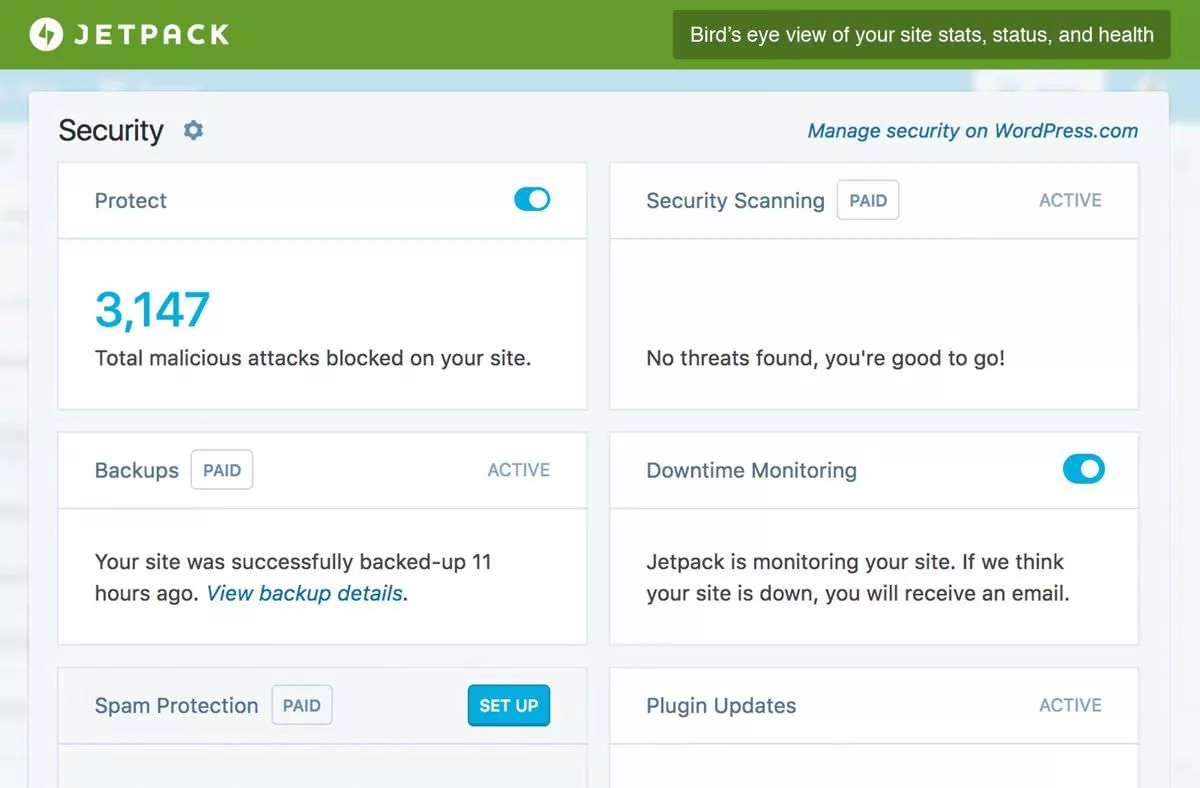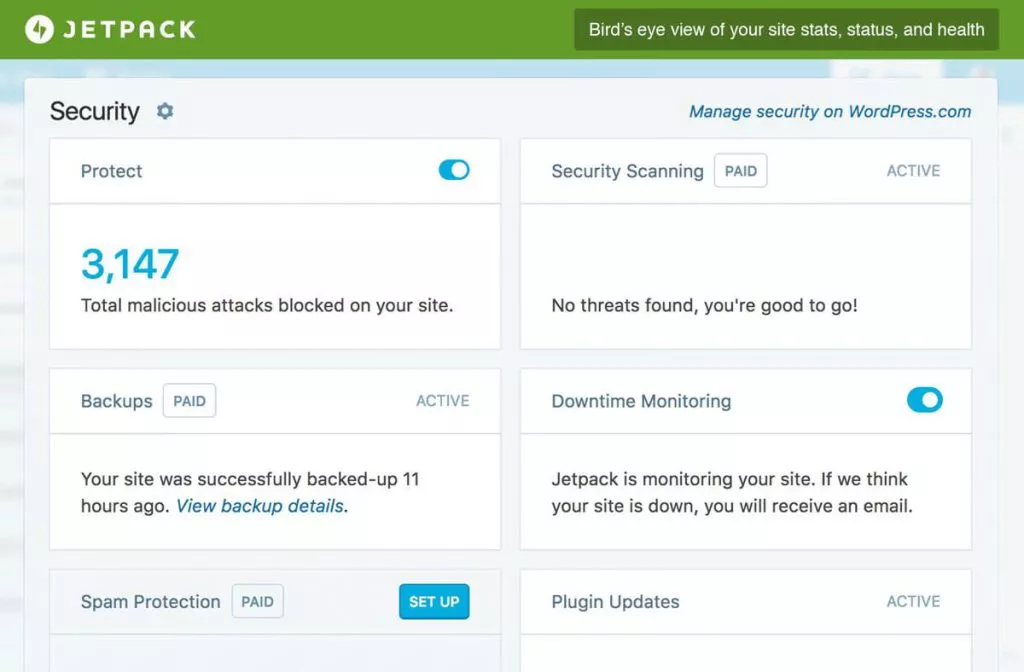For different kind of sites running on WordPress you need some particular kind of plugins. For instance, for online store, you need e-commerce plugins. Similarly, for photography site you need image-related plugins. However, if you’re a multisite admin, you can administer a WordPress Multisite network along with some useful plugins to help you manage your different websites.
So, in today’s post I am going to showcase a list of handy and useful WordPress plugins for managing multiple websites. I know you may have already heard about some of these plugins, but I kept them to compile a complete list of multisite plugins that works for everyone — even newbies. Lets take a look.
Read Also: 9 WordPress Plugins to Improve Images Performance
Jetpack
Jetpack, the multi-module plugin from Automattic, provides numerous features for multisite installations. What makes it interesting is that it protects your sites from brute force attacks and also monitors the uptime of your sites for free. Moreover, you can also configure 2-factor authentication for your users, and check stats and analytics in a single panel.


With Jetpack, you can also avail its content creation and optimization tools including an image CDN, simple embeds, carousels, slideshows, extra widgets, etc.; and discussion tools like email subscriptions, social login, and many more.
WordPress MU Domain Mapping
This excellent plugin solves an important multisite problem of editing server configuration files for adding hosts and making redirects. It enables any admin to map one or more domain to one of the websites in the multi-site network. Users can configure the plugin to setup domain mappings, and also set other settings for improved administration.
The plugin allows super admins to use ANAME or CNAME records, allowing the users to configure their sites easily using the preferred method. You can even add or delete domains, and have primary and secondary domains for a single website.
Multisite Plugin Manager
Multisite Plugin Manager is a useful plugin that allows you to adjust plugin permissions for every site in your network. Interestingly, you can activate or deactivate plugins in bulk on the network, saving you time and effort of doing it individually. And as a super admin, you can also override user control for specific plugins on the sites of your multisite network.
Multisite Enhancements
This plugin improves the dashboard’s network area for super admins with more info and quick utilities. These include adding useful items to ‘Network Admin’ admin bar, stating sites having a particular plugin or theme enables, etc.
You can even change the footer texts to get stats on RAM, SQL, etc. Not only these, this plugin also helps you to remove the WordPress logo from the admin bar and add favicon beside site name in the admin area, helping you to identify any site easily. Though these may seem small improvements but I bet they can save you few minutes a day.
WP Super Cache
This popular caching plugin generates static HTML files for your WordPress blog’s PHP scripts, and then after, your web server serves static files. WP Super Cache is backed by the Automattic team and provides multisite support, meaning you can install it on a multisite network and configure its settings, and it speeds up every site on your network.
It provides various options to do the same, and you can also enable or disable caching per sub-blog on your multisite network. And that means your website will have better page loading speeds, and that also means better search page rankings.
Yoast SEO
Yoast SEO is meant for improving your site’s SEO from all required aspects. It enables you to prepare your posts for search engines, including optimizing the use of focus keyword, optimizing the post’s meta information. The plugin is multisite compatible and it’s even possible to configure a set of default settings for all blogs on the network.
Using its snippet preview, you can determine how your post will look in the search results, and also edit its meta title and description. The plugin helps you to improve your site’s ranking in search result pages, and increase the click-through rate for organic results.
BackWPup
This plugin helps to save and store your WordPress installation in full, including the “wp-content” directory. And in the case of an emergency or data loss, you can easily restore everything with a single .zip backup file. The plugin being multisite compatible, you can take backups of the whole network, or any sub-blog without any hassle.
As a necessary requirement, the plugin does enable you to store the backup to a cloud drive to prevent file loss or damage. That being said, you can also push the backups to an external backup or storage service like Dropbox, S3, FTP, etc. Moreover, the plugin does additional optimization tasks like optimizing database, repairing database, etc.
WP Security Audit Log
WP Security Audit Log is a comprehensive audit log and user monitoring plugin that keeps a record of all activities occurring on a multisite network. Using this plugin and checking its notifications, you can track suspicious activities and prevent security issues.
Not only this, you can even monitor user activities, .e.g, when someone logs in or out from their dashboard, when a new user is created, etc. You can think it like a security camera in your office that tries to protect things and records video to check on thieves.
Multisite Cloner
This plugin helps you clone sub-blogs to create new blogs on the network without re-doing all the hard work. The new blog will contain the posts, uploads, plugins, theme settings, and even users from the master blog, after it is cloned successfully.
Of course, you can later deactivate or delete a clone same as you can do with any other sub-blog on a multisite network. Though it works as expected yet it misses a feature, using which, I could specify which all things (posts, plugins, etc.) should be cloned.
User Role Editor
User Role Editor lets you change the roles of users, excluding the administrator, of course. You can simply edit user roles and assign them capabilities per their responsibilities, e.g., a writer must have “create_posts” and an editor must have “publish_posts” capabilities.
Apart from that, you can create and delete the self-made roles for users having restricted or mixed types of capabilities. Moreover, as a bonus feature, you can also remove the unnecessary roles left behind after uninstalling other plugins.
User Switching
With the User Switching plugin, you can instantly switch user accounts by quickly logging in and out as your preferred user. The switching process is completely secure, and only super admins can do this on multisite installs. This plugin uses the cookie authentication system while remembering the accounts, thus also prevents leaking passwords.
Then after, you can quickly swap back to your super admin account with a single click using the “Switch back” link on dashboard screen or in the profile menu. That being said, this plugin is great for test environments where you need to log in and out between different accounts, e.g., if you wish to test a user role’s capabilities set by above plugin.
Unconfirmed
This plugin shows a list of inactivated user registrations, wherein you will be given the option to resend the original activation email, or you can also manually activate those users. It hels you catch false registrations and resend emails for genuine registrations that may have been caught by spam filters.
Multisite Language Switcher
This plugin adds multilingual support to a multisite network’s blogs, and thus, enables you to manage translations of posts, pages, tags, categories, and custom taxonomies. That means, using this plugin, you can easily translate your blogs and reach out to more people who will like to read your blog posts or reach to you in a new language.
Multisite Post Duplicator
Multisite Post Duplicator helps you clone any page or post from one multisite blog to another on the same network. It can copy post meta, featured image, post images, tags, categories, custom fields, etc. too, and also clone in batch mode.
Surprisingly, you can also create a duplication link of posts, wherein if you update a post, the other gets updated too. And from its settings page, you can configure everything about this plugin including restricting its functionality to only some sites on your network.
Network Shared Media
Network Shared Media enables you to access media from other sub-blogs on the same multisite network. It helps users to avoid uploading a duplicate image or media and use the first one instead of uploading again. It’s especially helpful when you are running multilingual sites, because you can use the same image again in the other blog.
With this plugin, you can view the uploaded images in other sub-blogs in a multisite environment and insert them with a single click. It enables such a feature by adding a new tab “Network Shared Media” to the “Add Media” window, from where you can view and choose an image from another sub-blog to insert in the current post.
Multisite Robots.txt Manager
This plugin helps you manage all robots.txt files for all sub-blogs on a WordPress Multisite network. You can create unique robots.txt files for individual websites, and amazingly, this plugin also allows you to mass update all the sites in the network. You can even scan and clean the old robots.txt files across blogs of the multisite network.
Wrapping up
I always suggest to install as less WordPress plugins as required or possible, and this post is no exception. And although I feel all above plugins are useful for a multisite network, but let me tell you that even I have not installed all of them on my network.
Happy administering, and remember, less plugins means more performance and security.
Which is your favorite among these? Have I not mentioned your favorite multisite plugin? Let me know using comments section below or write to me directly at @aksinghnet.
